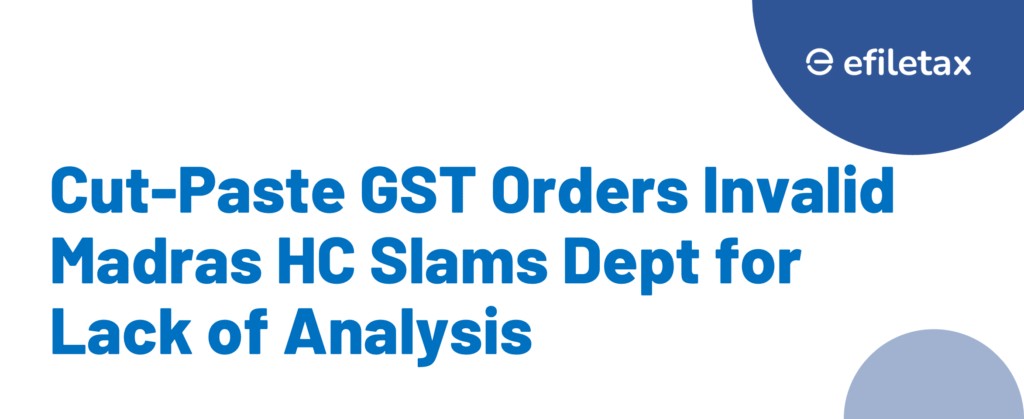
Intro:
GST order cannot copy assessee’s reply without analysis—this key takeaway comes from a recent Madras High Court ruling, which quashed a Section 74 order under CGST Act. The judgment sets an important precedent for GST assessments and adjudication standards in India.
What Was the Case About?
In this case, the taxpayer challenged a GST order issued under Section 74 of the CGST Act, 2017, alleging it lacked proper application of mind. The Assessing Officer (AO) had reproduced the assessee’s reply almost verbatim in the final order, without offering any independent reasoning or findings.
The Madras High Court found this to be a serious procedural lapse, rendering the order legally unsustainable.
Key Observations by Madras High Court
- The AO reproduced the reply of the assessee in the final order without any analysis or rebuttal.
- There was no discussion or reasoning as to why the officer disagreed with the reply.
- The order failed to show due application of mind, violating principles of natural justice.
Legal Basis:
The Court relied on Section 74(9) of the CGST Act, which mandates that proper officers shall issue a reasoned order after considering the representation of the taxpayer.
Why This Judgment Matters
This ruling is a critical safeguard for taxpayers. It reiterates that:
- A mechanical reproduction of taxpayer submissions without scrutiny cannot constitute a valid adjudication.
- Speaking orders are essential—tax authorities must record their reasoning and apply legal mind before concluding a tax liability.
- It prevents arbitrary imposition of tax, ensuring procedural fairness.
What Is Section 74 of the CGST Act?
| Provision | Summary |
|---|---|
| Section 74(1) | Invoked for tax evasion involving fraud, wilful misstatement, or suppression of facts |
| Section 74(5) | Allows voluntary tax payment before notice |
| Section 74(9) | Mandates a reasoned order post adjudication |
This case focused on non-compliance with Section 74(9).
Expert View: How Should Taxpayers Respond?
“Always insist on a reasoned speaking order. If your reply is ignored or merely copied, the order may be challengeable,” says Rajesh B., Advocate at Madras High Court.
Pro Tip:
- Maintain a recorded copy of your detailed reply.
- If the final order lacks reasoning, consider filing a writ petition under Article 226.
Legal Reference
- Case Name: M/s VGN Projects Estates Pvt Ltd v. The Assistant Commissioner (ST)
- Court: Madras High Court
- Order Date: June 2025
- Statute Involved: Section 74(9), CGST Act, 2017
- Read CGST Act on cbic.gov.in
What Should You Do If You Receive a GST Order?
Follow these steps:
- Read the order carefully – Check if your reply has been analysed or just copied.
- Check for reasoning – Was your response properly addressed?
- Preserve evidence – Keep email or portal acknowledgment of your reply.
- Consult a GST expert – Especially if you see signs of mechanical disposal.
- Explore legal remedy – You can file a writ petition if natural justice is violated.
Summary
Madras HC ruled that a GST order under Section 74 that merely copies assessee’s reply without analysis is invalid. It quashed the order citing lack of reasoning and violation of natural justice principles.
FAQ – GST Order Without Reasoning
Q1. What is a ‘speaking order’ in GST?
A speaking order contains proper reasoning, analysis, and clear findings by the tax officer.
Q2. Can I challenge a GST order that just copies my reply?
Yes. As per Madras HC, such orders violate Section 74(9) and are liable to be quashed.
Q3. What legal remedy do I have?
You can file a writ petition in the High Court under Article 226 of the Constitution.
Closing CTA:
⚖️ Received a flawed GST order? Don’t let it go unchallenged.
📩 Talk to our tax experts at Efiletax.in for professional support in filing replies, defending notices, and ensuring fair treatment.